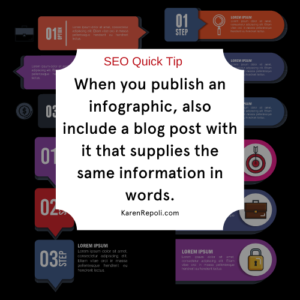How do you feel when you read the words Search Engine Optimization (SEO)? Do you experience a sudden feeling of confusion and dread? Does your brain shut down or go into flight mode? Take a deep breath and stay with me. It will be all right. Really. The basics of SEO are not difficult and may very well be all you need to know.
Leave the geeky stuff to your website designer. Instead, concentrate on using these basic tenants of SEO in your blog posts, social media, and other web-based content.
- When choosing keywords choose words people would type in a search engine if they were looking for the type of information or services you provide.
- Don’t skip the ‘alt’ tags on images. In WordPress, you can put text in the alt tag area. This should be a word or words that will mean something to search engines and viewers too.
- Ensure that you are using the right permalinks. The permalink is the full URL you see – and use – for any given post, page or other pieces of content on your site. You want them to be to describe what’s on the page and not include strange symbols.
- Just as you focus on external linking, you should also focus on internal linking. For example, under a blog post adding an “if you liked this you may like this” link below it may keep your readers reading longer. You or your web designer can install a WordPress plug-in that will take care of this automatically!
- Keep your content up-to-date. Add new content but also upgrade old content by ensuring it’s still relevant and all links work. This is a great task to outsource to a virtual assistant.
- The best domain name for good SEO is a name that is short, and has keywords. How your domain extension (ie .com, .biz .ca etc.) affects your google ranking is the subject of much debate. I always say if you can get the “.com” it’s best. If you want to delve deeper into this topic, here is an excellent post from SEO Power Suite.
- Headlines matter a great deal when it comes to SEO. Create headlines that include keywords and aren’t tricky.
 When you publish an infographic, also include a blog post with it that supplies the same information in words.
When you publish an infographic, also include a blog post with it that supplies the same information in words.- For a boost in SEO effectiveness, try posting longer posts. Longer posts show authority which Google likes. There are various opinions regarding how long your posts should be. I like to follow the ‘miniskirt’ guideline: long enough to cover everything but short enough to keep it interesting.
- If you guest blog, choose blogs that are relevant to your site, have the same audience, rank higher than your site, and receive a lot of engagement.
- A good off-page SEO tip is to start posting in relevant groups on social media that have a lot of engagement and traffic. Don’t focus on promotion, as that will usually get you kicked out, just engage and be helpful.
- Improve your website’s loading speed. For 13 ways to do this take a look at this guest blog by Andrew Wise.
- Ensure that your site is more than just mobile friendly. It should work perfectly whether mobile or on a PC, unless your business can survive missing sales.
- Pay attention to your site’s description and the way it appears in search results. It should include keywords but also be readable by people as well as search engines.
- Use keywords and keyword synonyms in your H1 and H2 Tags, Header, Subheader, Title and site descriptions. You can use Wordstream’s Keyword Tool to find the most effective ones.
- Step outside the box to find keywords by looking at what your audience is talking about on social media Put yourself in your visitors’ shoes. If you were shopping for “My wonderful widget.” What would you type in the search box?
- Don’t overlook Long Tail Keywords. They are those three and four keyword phrases which are very, very specific to whatever you are promoting. When potential customers use long descriptive phrases when searching the web, they are usually in the mood to buy. Get them while they’re hot!
- Put your share buttons in prominent places on your website and blog to make it simple for people to share. They won’t share if they can’t find it fast. Don’t make them search for it.
- If you sell products whether physical or digital, it’s important to optimize product description pages. Treat them just like you would a blog post for best results.
- Internal linking can help boost important pages that aren’t getting love. Link to those pages from active pages on your site.
I hope these tips take some of the dread out of the words, SEO Marketing. If you have any questions, leave a comment on my Facebook page.
